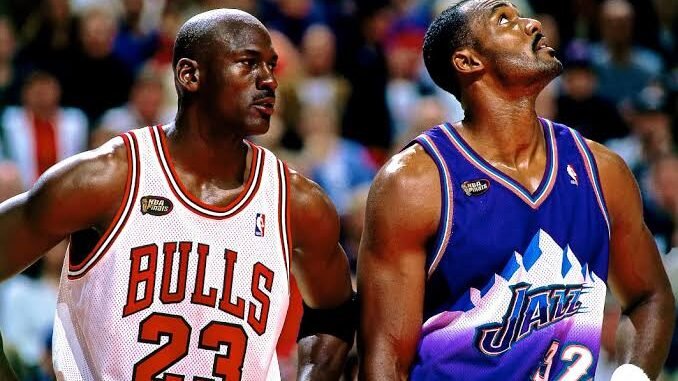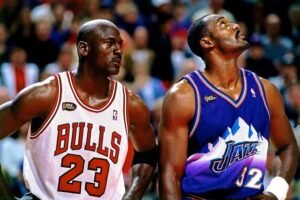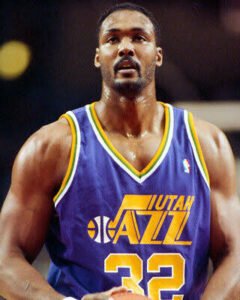
Karl Malone Reflects on What Might Have Been: “If It Was LeBron Instead of Jordan, I’d Have Two Rings”
Karl Malone, one of the most formidable power forwards in NBA history, recently reignited one of basketball’s most polarizing debates with a provocative reflection on his career. Known as “The Mailman” for his consistent delivery on the court, Malone carved out a Hall of Fame résumé: two NBA Most Valuable Player awards, 14 All-Star selections, and a long-standing place among the league’s all-time leading scorers. And yet, despite all of his accolades and nearly two decades of elite performance, there’s one thing Malone never achieved—a championship.
In a recent interview, Malone offered a striking hypothetical that’s reverberated throughout the basketball world. Looking back on the two NBA Finals losses he suffered at the hands of Michael Jordan’s Chicago Bulls, Malone suggested that his legacy might have looked drastically different had he faced LeBron James in those crucial series instead.
“If I had gone up against LeBron James instead of Michael Jordan in the Finals,” Malone said confidently, “I’d have two championships and two Finals MVPs. No question.”
That quote, dripping with confidence and what-if possibility, has sparked intense conversation across social media, television panels, and barbershops alike. What Malone presents isn’t just a personal grievance or revisionist history—it’s a challenge to the widely held belief that Michael Jordan is the greatest player of all time. His assertion reopens the floor for the age-old debate between MJ and LeBron, but through a different lens: how did each player impact the legacies of their opponents?

Malone’s Career at a Glance: Consistency and Dominance
Drafted by the Utah Jazz in 1985, Karl Malone wasted no time establishing himself as a dominant force. He paired with John Stockton to form arguably the most efficient duo in NBA history. Their deadly pick-and-roll was the centerpiece of Utah’s offense and struck fear into opposing defenses for nearly two decades. By the mid-1990s, Malone had evolved into one of the league’s most complete players—strong, fast, skilled, and an elite scorer from the midrange and the post.
Under head coach Jerry Sloan, the Jazz became perennial contenders in the Western Conference. By the time they broke through to the NBA Finals in 1997 and again in 1998, Malone was playing the best basketball of his life. He had just secured his first MVP award in ’97 and followed it with another dominant season in ’98. The Jazz, built on chemistry, precision, and grit, were poised to finally win their first championship.
But standing in their way was Michael Jordan and the Chicago Bulls. And as Malone now openly admits, those Bulls teams proved to be a wall too tall to climb.
The Jordan Roadblock
Malone’s biggest frustration—and perhaps what underlies his recent comments—comes from just how close Utah came to winning it all. In both the 1997 and 1998 NBA Finals, the Jazz battled the Bulls in tightly contested six-game series. Neither was a blowout, and both were packed with drama, physicality, and moments that have since become NBA lore.
Malone was spectacular in those series, averaging over 23 points and double-digit rebounds while being tasked with anchoring the offense and dealing with Dennis Rodman’s relentless defense. Yet, despite his best efforts, Michael Jordan’s brilliance simply proved too much.
Game 5 of the 1997 Finals is remembered for Jordan’s legendary “Flu Game,” in which he scored 38 points despite being visibly ill. In 1998, it was Jordan once again playing the role of heartbreaker—this time with one of the most iconic plays in NBA history. With just seconds remaining in Game 6, Jordan stole the ball from Malone in the post, dribbled upcourt, and hit the go-ahead jumper over Byron Russell to win his sixth and final NBA title.
Malone was left to walk off the court knowing he had played great basketball, but greatness on the other side had proven even greater. And that’s what makes his new take so compelling.
What If It Was LeBron?
When Karl Malone says he would have two rings if he faced LeBron James instead of Michael Jordan, he’s not necessarily diminishing LeBron’s talent. Instead, he’s highlighting the difference in their competitive makeup and in-game approaches. Jordan’s game was built on ruthless efficiency, intense mental warfare, and a killer instinct that often left his opponents demoralized before the final buzzer. He was a closer in every sense—a player who never hesitated to take and make the final shot.
LeBron, while arguably more physically gifted—standing 6’9”, weighing 250 pounds, and blessed with elite court vision and athleticism—has taken a different route to success. His style emphasizes team play, versatility, and empowerment of his teammates. He’s more likely to make the right basketball play than force a shot in crunch time. That approach has worked wonders, as LeBron has made 10 Finals appearances and won four championships across three different franchises.

But for players like Malone, who pride themselves on toughness, grit, and seizing big moments, LeBron’s leadership style might seem less daunting. Malone appears to believe that his Jazz team would have been better equipped to handle LeBron’s pass-first mentality and composure, compared to Jordan’s relentless scoring barrage and psychological dominance.
Could History Have Been Rewritten?
Malone’s statement invites us to reimagine those 1997 and 1998 Finals under a different scenario. Imagine LeBron James, not Michael Jordan, leading the Bulls against Utah. Would the Jazz have found a way to out-tough or outmaneuver a LeBron-led team?
Malone believes so. He sees his team—hardened veterans like himself, Stockton, Jeff Hornacek, and Bryon Russell—as built to withstand LeBron’s style. They were physical, disciplined, and methodical. Against a LeBron-led Bulls team, Malone implies, the Jazz could have executed their game plan with fewer psychological hurdles. And perhaps, with Jordan out of the picture, Malone would have raised the trophy not once, but twice.
More Than a Personal What-If
While some critics view Malone’s quote as self-serving or even dismissive of LeBron’s greatness, others see it as a rare moment of raw honesty. Few players are as closely linked to the pain of facing Jordan as Malone. His words reflect not only a competitive edge that’s never gone away, but also the mental toll of being denied greatness by another’s dominance.
In many ways, Malone’s remark is less about LeBron and more about Jordan’s grip on an entire generation. He was the ultimate gatekeeper—the player who didn’t just beat his rivals but defined their limitations. From Malone and Stockton to Patrick Ewing and Charles Barkley, an entire era of Hall of Famers was left ringless because they had the misfortune of peaking during Jordan’s reign.
A Legacy Shaped by Circumstance
Ultimately, Karl Malone will go down as one of the NBA’s all-time greats, ring or no ring. His numbers, durability, and competitive fire are unquestionable. But the shadow of Jordan looms large, even decades later. And Malone’s recent comments are a reminder that the GOAT debate isn’t just a media obsession—it’s personal to the players whose legacies were shaped by those historic clashes.
Whether you agree with Malone or not, his words add new depth to the MJ vs. LeBron argument. They remind us that greatness is not measured solely by stats or championships, but by the ripple effects players have on those around them—especially their fiercest rivals.
Leave a Reply